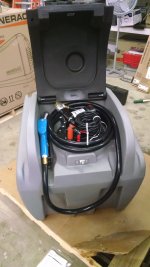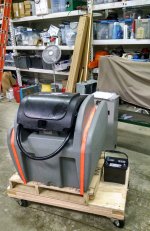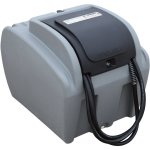You are using an out of date browser. It may not display this or other websites correctly.
You should upgrade or use an alternative browser.
You should upgrade or use an alternative browser.
Traction Incredible - No damage resulting from putting gas into my Kioti Diesel Engine
- Thread starter rademamj1
- Start date
- Views: 14298
More options
Who Replied?
/ Incredible - No damage resulting from putting gas into my Kioti Diesel Engine
#31
rademamj1
Veteran Member
- Joined
- Oct 8, 2019
- Messages
- 1,131
- Location
- Waco, Texas
- Tractor
- Kioti CK4010 SEHC, Kubota GR2120, Gravely Proturn 460
I know exactly what you mean dumb mistakes. My mistake came at the very end of the day, working seven hours with the tractor doing stump grinding and wood chipping. Temperature was 98F in Texas that day, and certainly contributed to my lack of focus. I have Gas clearly marked on my yellow cans and Diesel clearly marked on my red cans, and i still made this dumb mistake. The injectors were pinging loudly, so there was mechanical noise from those injectors. The good news is, after 11 hours additional use on the tractor, I have no problems. But still waiting for the Tier-4 DPF emissions to enter a burn cycle. The gas in the fuel, triggered an immediate DPF burn, which was stronger sulphur smell than normal.The older I get, the simpler I try to make things. It ticks me off when I make stupid mistakes, knowing full when that the mistake shouldn,t of happened. Hopefully adding gas to your diesel engine didn,t hurt it.
The outcome of this is accidental use of gas in a diesel engine, for a short time, probably will not result in damage. Full drainage of the tank and replacing the fuel filter helps to full recovery.


SPYDERLK
Super Star Member
- Joined
- Feb 28, 2006
- Messages
- 12,495
- Location
- VA
- Tractor
- JD2010, Kubota3450,2550, Mahindra 7520 w FEL w Skid Steer QC w/Tilt Tatch, & BH, BX1500
Good post! I hadnt thought of that effect.Years ago, Mercedes came out recommending up to 10% gasoline in diesel as a fix to winter diesel problems. Then they rescinded that when they found out that such a mix can cause a very explosive atmosphere in the fuel tank. Normally, diesel tank atmosphere is too lean for an explosion to happen, and gasoline tank vapor spaces are too rich.
Good to hear that nothing bad happened, which enhances my feeling about any needed "lubricity" for today's diesel fuel. You lost it with the gasoline. The fuel injectors are designed for low/no lubricity needed. Probably the lobes or whatever in the pumps don't actually touch.
I use red and blue "cans" for diesel but clearly mark them as DIESEL.
Ralph
That one confuses me. VW uses the exact same tank and in-tank pump for their gassers and their diesels. Diesel doesn't emit much vapor at normal atmospheric pressure and temp, while gasoline emits vapor at around 77 degrees Fahrenheit. And it's the vapor that "rapidly combusts", or explodes. (Neither liquid gasoline or liquid diesel will ignite.) I can't see how putting both gasoline and diesel in the same tank would cause a problem. (Now, you are not supposed to fill a gasoline tank to the top because there needs to be room for vapor expansion, while this isn't necessary for diesel...)
Essentially, yes.. The problem is that diesel fuel has low volatility and a high flash point, so it is too lean for the tank fumes to ignite.
Gas has a very low flash point but very high volatility, so the fumes in the tank are too rich to ignite.
Combine a little highly volatile gas with a volume of low volatility diesel, and you have the conditions for a tank explosion, ie the a/f ratio of the tank vapors are in the region that it could explode.
A physical conception is helpful to appreciate the effect:
. . . In a solution the solutes sort of get in the way of solvent properties. Examples are freeze point changes of water with addition of anti freeze, salt, sugar, etc. The phase change to gaseous state is also affected, but not as obvious.
In a diesel/gasoline tank mix the inhibition of gasoline evaporation is more quickly offset by re condensation back into to liquid from the overlying trapped atmosphere. As gaseous gas becomes more concentrated an equilibrium arises where evaporation = condensation. This equilibrium point can more readily be explosive in a mixed tank.
I know exactly what you mean dumb mistakes. My mistake came at the very end of the day, working seven hours with the tractor doing stump grinding and wood chipping. Temperature was 98F in Texas that day, and certainly contributed to my lack of focus. I have Gas clearly marked on my yellow cans and Diesel clearly marked on my red cans, and i still made this dumb mistake. The injectors were pinging loudly, so there was mechanical noise from those injectors. The good news is, after 11 hours additional use on the tractor, I have no problems. But still waiting for the Tier-4 DPF emissions to enter a burn cycle. The gas in the fuel, triggered an immediate DPF burn, which was stronger sulphur smell than normal.
The outcome of this is accidental use of gas in a diesel engine, for a short time, probably will not result in damage. Full drainage of the tank and replacing the fuel filter helps to full recovery.
Nobody likes making mistakes, but I've also come to appreciate "A Bad Accident is one that money can't fix".
With just a bit more luck holding, you may well have dodged a bullet :thumbsup:.
Who Knows ? Not suggesting that you repeat the tactic, but maybe you just pulled off an excellent cleaning of the DPF !
Rgds, D.
uglydukwling
New member
It may be reassuring to remember that there are multifuel engines out there designed to run on both gas and diesel.
Reo multi-fuel army trucks were one example. If I remember correctly, Reo called that truck the Eager Beaver. I never owned one, so I don't know what was required to switch from one fuel to the other.
I do have a Rolls-Royce K60 diesel that is called multi-fuel. I've never run it on gasoline, but the manual says it makes the transition automatically, depending on the density of the fuel. Again, I'm not sure what is involved, but apparently it changes injection timing, possibly amount of fuel injected, maybe other things, but it does run both fuels through the same engine.
On the subject of the old Mercedes diesels, I had a few vehicles (180d, 319d) powered by the om636 engine. One thing I remember about them is that the injection pump didn't depend entirely on diesel for lubrication. One extra task on that engine was checking the level of lube oil in the sump of the injection pump.
Reo multi-fuel army trucks were one example. If I remember correctly, Reo called that truck the Eager Beaver. I never owned one, so I don't know what was required to switch from one fuel to the other.
I do have a Rolls-Royce K60 diesel that is called multi-fuel. I've never run it on gasoline, but the manual says it makes the transition automatically, depending on the density of the fuel. Again, I'm not sure what is involved, but apparently it changes injection timing, possibly amount of fuel injected, maybe other things, but it does run both fuels through the same engine.
On the subject of the old Mercedes diesels, I had a few vehicles (180d, 319d) powered by the om636 engine. One thing I remember about them is that the injection pump didn't depend entirely on diesel for lubrication. One extra task on that engine was checking the level of lube oil in the sump of the injection pump.
ritcheyvs
Veteran Member
...On the subject of the old Mercedes diesels, I had a few vehicles (180d, 319d) powered by the om636 engine. One thing I remember about them is that the injection pump didn't depend entirely on diesel for lubrication. One extra task on that engine was checking the level of lube oil in the sump of the injection pump.
Mechanical Mercedes Diesel injection pumps are removable units that included the camshaft that operated the plungers. The older style (as cited) had its own oil reservoir to lubricate the camshaft, tappets, and rack/control sleeves and that oil required periodic change. Newer Mercedes Diesel injection pumps were lubricated by the regular engine oil so it got changed with every oil change.
Our agricultural Diesels are different. The camshaft is inside the block and driven by the gears on the front of the engine. So the bottom end of the injection pump (camshaft, tappets, rack, etc.) is easily lubricated by engine crankcase oil. Still, the plungers and close-fitting cylinders (plus injectors and delivery valves) are lubricated only by fuel. So I have to wonder how long they would survive on 100% gasoline.
thepumpguysc
Elite Member
About 15 minutes..{max}
LouNY
Super Star Member
- Joined
- Jul 4, 2015
- Messages
- 14,100
- Location
- Greenwich, NY
- Tractor
- Branson 8050, IH 574, Oliver 1550 Diesel Utility (traded in on Branson) NH 8160. Kioti CK2620SECH
About 15 minutes..{max}
I'm surprised you would give it that much time,
I would have guessed less then a minute with 100% gas, a blend which is the most likely to happen could give a chance at longer.
koshari
Silver Member
- Joined
- Jul 10, 2019
- Messages
- 225
- Tractor
- Kioti ck35 , Deutz agrolux 4.80e, Deutz Agrotron 6.00 TT, Kobelco sk30ur excavator.
I致e always put whatever fuel I want in whatever can I have. Apparently some people can稚 see and smell the difference in gas and diesel.
its thinking like this that results in things like, different countries driving in opposite sides of the road, different countries using metric and AF bolts, and having beta and VHS video cassettes at one stage.
oh and by the way i have done this b4, one of the petrol stations in town insists on having a black hose on their premium unleaded pumps, the same colour everyone else uses here for diesel. fortinately i realised before i attempted to start the engine, but was a hassle aranging a frind to tow me to his workshop to lift the car on the hoist and drain the offending fuel from the tank. plus having to pay for 80 litres of fuel i didn’t want.
JimR
Elite Member
If I were you I would pull this post down just in case you ever have a problem with your motor. If Kioti sees it you will lose your warranty on it for running it with gas in it.


